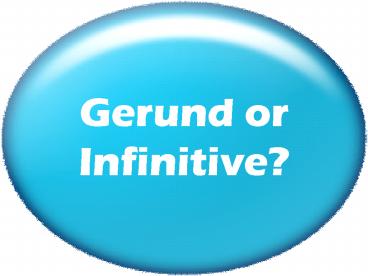Gerund or Infinitive? - PowerPoint PPT Presentation
1 / 22
Title:
Gerund or Infinitive?
Description:
Gerund or Infinitive? To form gerunds, use the base form + ing (don t forget the rules for spelling of ing form of verbs) I enjoy learning English To form ... – PowerPoint PPT presentation
Number of Views:3068
Avg rating:3.0/5.0
Title: Gerund or Infinitive?
1
Gerund or Infinitive?
2
We select the ing from....
To create a NOUN from a verb to express a general
idea(Subject of the sentence in most
cases) Paying attention is essential in class
3
After any preposition I am looking forward to
hearing from you
4
After certain verbal expressions (cant stand,
cant help, be/get used to, dont mind/would
mind, its no use, its not worth) I cant help
getting angry when pupils speak in class
5
- As Direct Object of a list of verbs (continue,
enjoy, like, love, prefer, suggest, recommend,
etc...) - I prefer going to the beach
6
To form gerunds, usethe base form
ing(dont forget the rules for spelling of ing
form of verbs)I enjoy learning EnglishTo form
negative gerunds, use not gerundNot speaking
English well is my biggest problem in this
country.
7
List of verbs followed by ing form
Verbs Followed by a GerundThey enjoyed working on the boat. Verbs Followed by a GerundThey enjoyed working on the boat. Verbs Followed by a GerundThey enjoyed working on the boat. Verbs Followed by a GerundThey enjoyed working on the boat. Verbs Followed by a GerundThey enjoyed working on the boat.
admitadviseappreciateavoidcan't helpcompleteconsider delaydenydetestdislikeenjoyescapeexcuse finishforbidget throughhaveimaginemindmiss permitpostponepracticequitrecallreportresent resistresumeriskspend (time)suggesttoleratewaste (time)
8
We select Infinitive....
To form the subject of a verb that refers to
something specific To answer this question is
essential
9
After some adjectives and/or adverbs I am
happy to announce my daughters wedding The
wall was too high to jump for young children
10
After the Indirect Object of certain verbs
(advise, invite, warn, teach, ...) The
Headmaster warned the student not to do that
again
11
- Verbs of perception(hear, feel,...) LET MAKE ?
INF without TO - I heard him enter the house Let me explain
She made me do it.
12
To form infinitives useto base form of the
verbI want to danceTo form negative
infinitives useNot infinitiveHe decided not
to go to the party.
13
List of verbs followed by Infinitive
Verbs Followed by an InfinitiveShe agreed to speak before the game. Verbs Followed by an InfinitiveShe agreed to speak before the game. Verbs Followed by an InfinitiveShe agreed to speak before the game. Verbs Followed by an InfinitiveShe agreed to speak before the game. Verbs Followed by an InfinitiveShe agreed to speak before the game.
agreeaimappeararrangeask attemptbe ablebegbegincare choosecondescend consentcontinuedaredecidedeservedetestdislikeexpectfailforgetgethappen havehesitatehopehurryintendleapleavelikelonglovemeanneglect offeroughtplanpreferprepareproceedpromiseproposerefuseremembersay shootstartstopstriveswearthreatentryusewaitwantwish
14
Verbs followed by Object and an Infinitive
Verbs Followed by an Object and an InfinitiveEveryone expected her to win. Verbs Followed by an Object and an InfinitiveEveryone expected her to win. Verbs Followed by an Object and an InfinitiveEveryone expected her to win. Verbs Followed by an Object and an InfinitiveEveryone expected her to win. Verbs Followed by an Object and an InfinitiveEveryone expected her to win.
adviseallowaskbegbringbuildbuychallenge choosecommanddaredirectencourageexpectforbidforce havehireinstructinviteleadleaveletlike lovemotivateorderpaypermitpersuadepreparepromise remindrequiresendteachtellurgewantwarn
Note Some of these verbs are included in the list aboveand may be used without an object. Note Some of these verbs are included in the list aboveand may be used without an object. Note Some of these verbs are included in the list aboveand may be used without an object. Note Some of these verbs are included in the list aboveand may be used without an object. Note Some of these verbs are included in the list aboveand may be used without an object.
15
Verbs that can be followed by both INFINITIVE
or -ING
No change in meaning begin, propose, forbid,
intend, start.. With a difference meaning
REMEMBER, FORGET, REGRET, STOP,
TRY... REMEMBER/FORGET/REGRET INFINITIVE?
Future -ing ? Past
16
- Examples
- I remember attending to dance classes when I was
a child - Remember to revise the questions before handing
out the exam - My grandmother forgot to lock the door when she
left the house - I repeated the activity because I forgot doing
it last week
17
Verbs that can be followed by both INFINITIVE
or -ING
STOP ING ?dont do this any longer
INFINITIVE ?stop doing something to start a new
action Examples You have to stop writing at 10
oclock. After five hours of hard work we
stopped to have a rest
18
- TRY
- ING ? experiment
- INFINITIVE ? make the effort
- Examples
- I was trying to open the door but I couldnt.
- Why dont you try using this key?
19
Verbs that are followed by a noun phrase
infinitivecan also be followed by a gerund.The
gerund makes it general and the infinitive make
specific the person indicated.They allow
smoking in this building.They allowed me to
smoke in the house.
20
These verbs areadviseallowencouragepermitre
quireurge
21
Both gerunds and infinitives can occur in the
perfect formhaving doneto have doneIt is used
to indicate that the activity is in the pastWe
appreciate having heard her sing.Were fortunate
to have heard her sing
22
Havemakeletare causative verbs. They cause
someone to do something.They are always followed
by a noun phrase base form of verb.Do not use
an infinitive after these verbs.She made me
fall.































